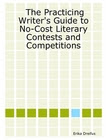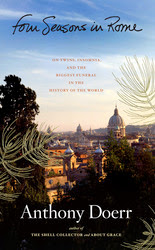Monday Morning Markets/Jobs/Opportunities
Attention, New York writers! “Artists’ Fellowships are $7,000 cash awards made to individual originating artists living and working in the state of New York for unrestricted use.” For the current grant cycle, applications are welcome in the fields of fiction, playwriting/screenwriting, and other (visual/performing) art fields. The application deadline is October 3, and there’s no application fee. There are, however, several eligibility criteria (for example, I am not yet eligible to apply because I have not lived in New York long enough). Check the NYFA site for more information and application materials.
==========
And here’s something for writers in Washington, D.C.: “Poets & Writers, Inc. is pleased to invite you to apply for the 2008 Maureen Egen Writers Exchange Award.” This award is open to writers in different states each year. This year Washington D.C. resident poets and fiction writers who have a) never published published a book, or b) have published (self-published books do not count) no more than one full-length book in the genre in which they are applying, and c) have resided in D.C. for at least two years prior to manuscript submission are eligible. Prize in each genre includes $500; a trip to New York City in October 2008 to meet with editors, agents, publishers, and other writers; and an optional one-month residency at the Jentel Artist Residency Program in Wyoming. There’s no application fee. Deadline: December 1, 2007. Details and entry form here.
==========
Crab Orchard Review is looking for submissions (fiction, poetry, and creative nonfiction) for a special issue on “‘The In-Between Age: Writers on Adolescence.'” Pays: $20/published magazine page ($50 minimum for poetry, $100 minimum for prose). Submission deadline: October 31. Guidelines here. (via CRWROPPS)
==========
If you’re planning to pitch Fit Pregnancy, you may find this profile of new Associate Editor Jennifer Carofano helpful.
==========
Thinking of pitching ELDR, a new publication whose tagline is “Celebrate Aging”? Read this column about the magazine for more information about its focus and editorial interests.
==========
Received an announcement last week from A Midsummer Night’s Press about two new annual anthologies: Best Gay Poetry and Best Lesbian Poetry. For the 2008 editions, they’re looking for poetry published during 2007. “Poems can have appeared in print or online magazines, journals, or anthologies; we are also willing to consider poems from books or chapbooks first published in 2007, even if the poem was originally published previously in periodicals, so long as the poet has the right to reprint the poem.” The publisher tells me that compensation will be determined once the final number of contributors is known (dividing up a small budget). Deadline: December 1, 2007. Submission information here.
==========
The University of the Arts (Philadelphia) is looking for an “established poet/teacher…to teach one or two sections of Poetry Writing Workshop at The University of the Arts.” See the announcement at HigherEdJobs.com.
==========
The State University of New York at Buffalo is searching for an associate/full professor of English. Specifically, they seek a “Prestigious poet committed to the innovative traditions of modernist and contemporary poetry. Candidates must currently hold the rank of associate professor or professor and/or have an extensive and distinguished record of publication. Candidates must demonstrate an ability to teach solid and inventive undergraduate courses, and bring fresh perspectives to the study of poetry and poetics as demonstrated by a record of writing and teaching interests appropriate to seminars in large M.A./Ph.D program.” Application deadline: October 15, 2007. More information at HigherEdJobs.com.
==========
The Massachusetts College of Pharmacy and Health Sciences (Boston) is calling for adjunct faculty to teach Expository Writing. See the announcement at HigherEdJobs.com.

